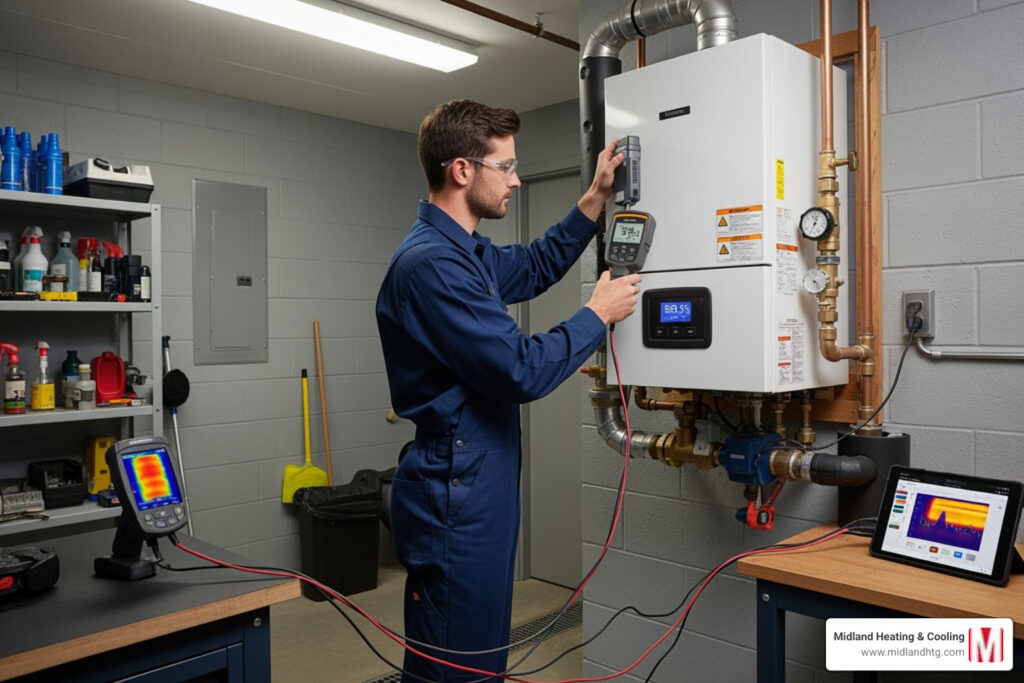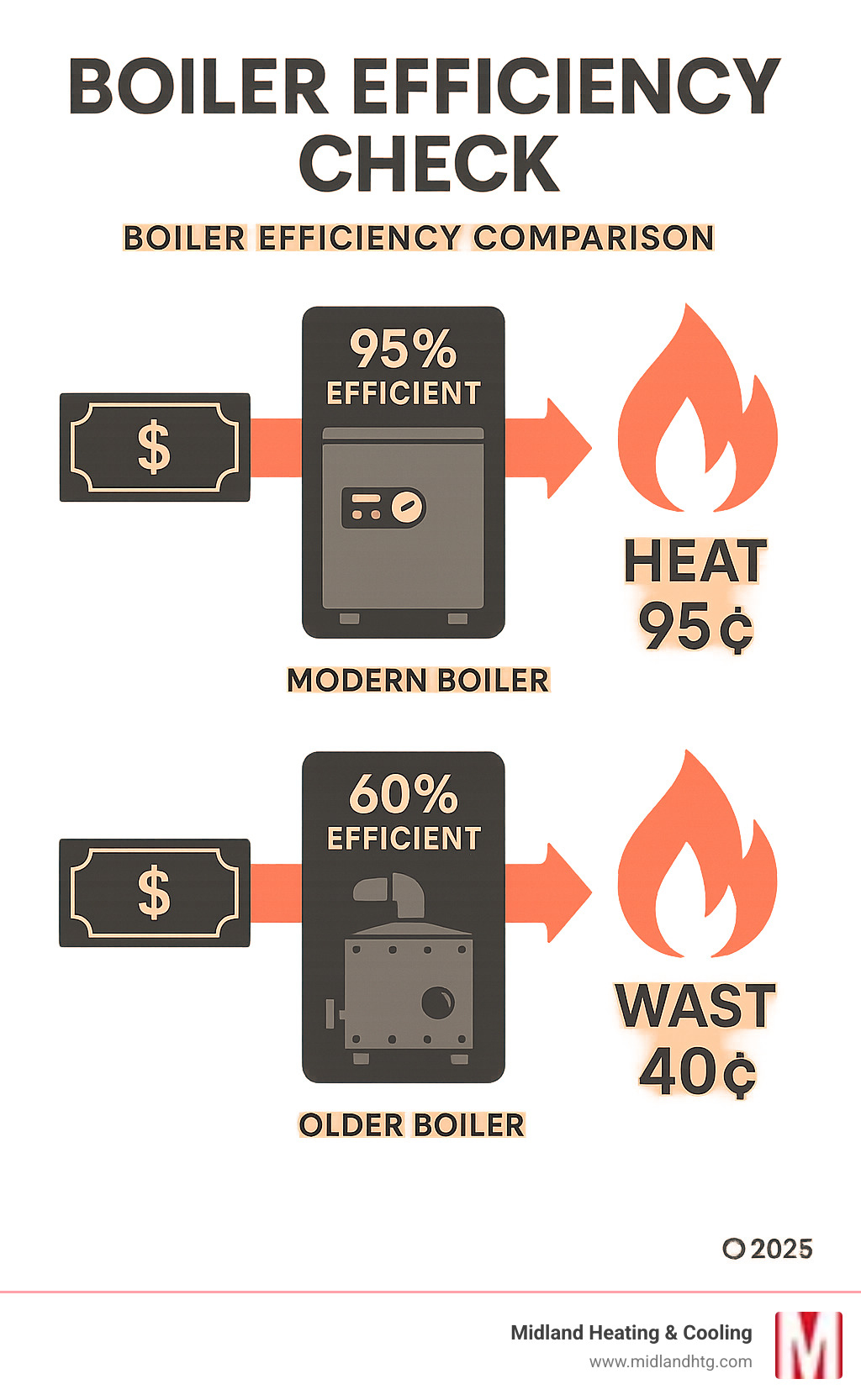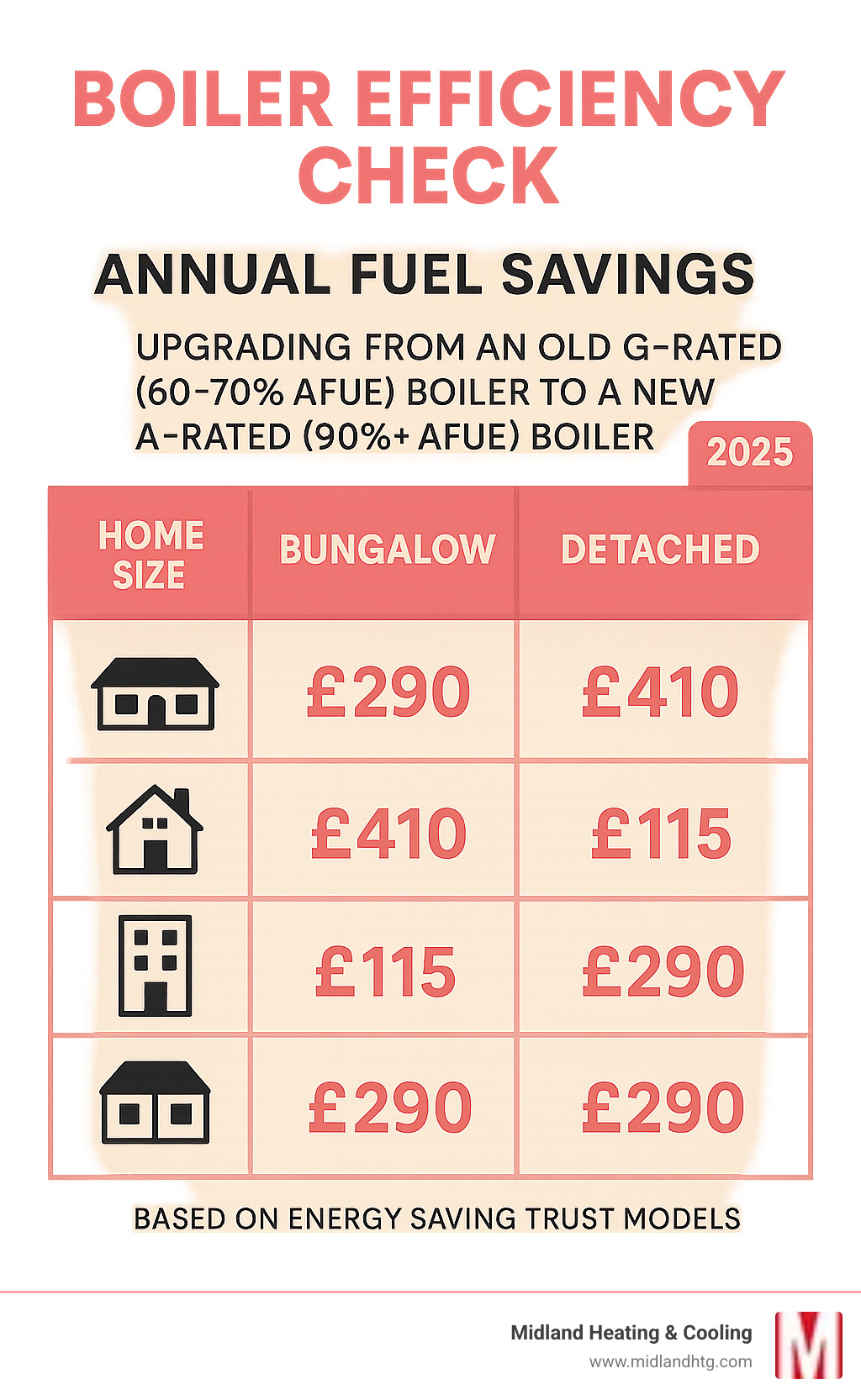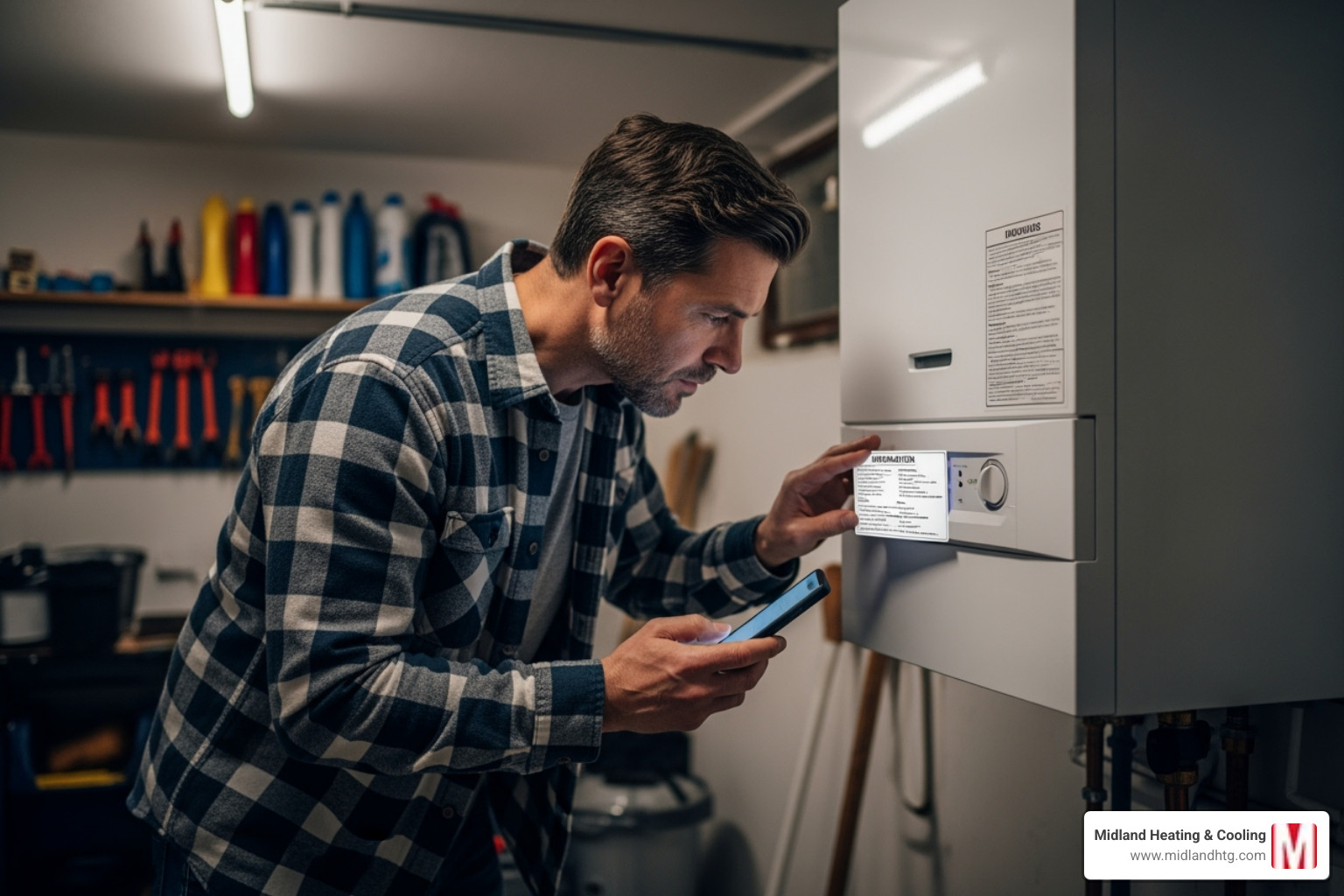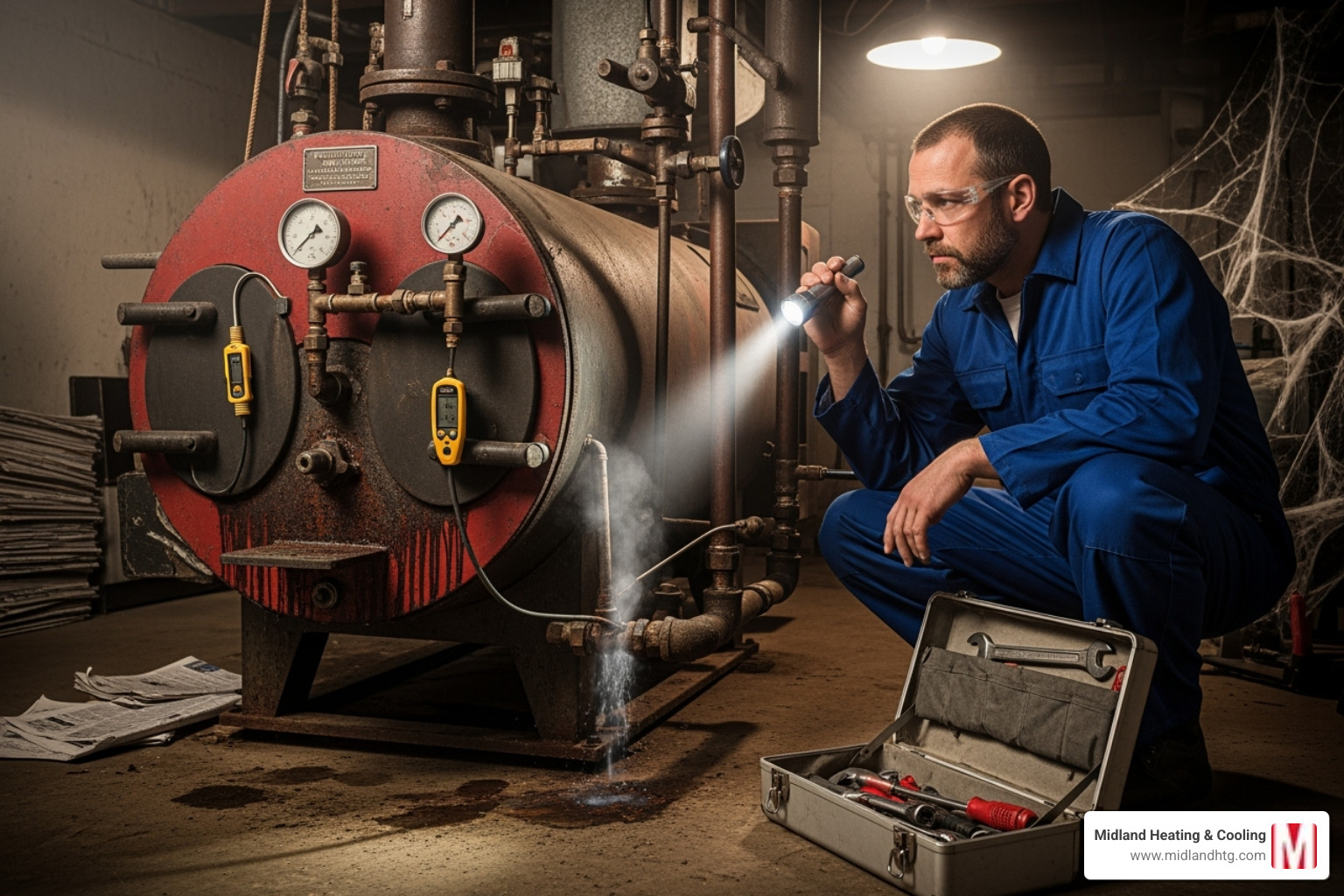Why Your Boiler’s Efficiency Matters More Than You Think
A boiler efficiency check is the process of determining how effectively your heating system converts fuel into usable heat for your home. Here’s what you need to know:
Quick Boiler Efficiency Check Methods:
- Find the AFUE sticker – Look for the Annual Fuel Utilization Efficiency rating on your boiler or in the manual
- Check by age – Boilers 20+ years old typically run at 60-70% efficiency, while modern units achieve 90%+
- Schedule professional testing – HVAC technicians use combustion analyzers for precise measurements
- Watch for warning signs – Rising bills, uneven heating, and strange noises indicate poor efficiency
What the Numbers Mean:
If your heating bills have been creeping up year after year, your boiler might be wasting more fuel than you realize. A boiler operating at 94% efficiency converts almost all the fuel into heat energy, wasting only 6%, while older units may waste 30-40% of the fuel you’re paying for.
The good news? Checking your boiler’s efficiency is simpler than most homeowners think. You don’t always need expensive testing equipment or a technician visit to get a good sense of how your system is performing.
Understanding your boiler’s efficiency helps you make smart decisions about maintenance, repairs, and replacements. It also puts you in control of your energy costs instead of letting them control you.
What is Boiler Efficiency and Why Does It Matter?
At its core, boiler efficiency is a measure of how much of the fuel your boiler consumes is converted into usable heat for your home. Think of it like this: if your boiler has an efficiency rating of 90%, it means that for every dollar you spend on fuel, 90 cents are turned into heat, and only 10 cents are lost as waste. This conversion rate is typically expressed as Annual Fuel Utilization Efficiency, or AFUE. Higher AFUE ratings mean less wasted energy and more heat for your buck.
We often look for the ENERGY STAR label when buying new appliances, and boilers are no exception. An ENERGY STAR certified boiler signifies that the unit meets strict energy efficiency guidelines, ensuring it will save you money on energy bills and reduce your environmental footprint. The importance of this extends beyond just your wallet; it plays a significant role in our collective effort to conserve energy.
For a deeper dive into the specifics, you can learn more about What is AFUE? and how it’s calculated. Also, understanding the various types of heating systems can help you appreciate the efficiency differences; explore our guide on Understanding Different Types of Boilers to see how different designs impact performance.
The Financial Benefits of an Efficient Boiler
Let’s talk money, because that’s often where the rubber meets the road. Upgrading to a high-efficiency boiler can lead to substantial financial benefits. While the initial investment might seem higher, the long-term savings on your energy bills can be significant, offering a strong return on investment over the boiler’s lifespan.
Consider this: ENERGY STAR certified gas boilers, with AFUE ratings of 90% or greater, can save you around $780 over the lifetime of the product compared to standard models. For oil boilers, an ENERGY STAR certified unit (87% AFUE or greater) can save about $200 over its lifetime. These savings accumulate year after year, making a noticeable difference to your household budget.
To give you a clearer picture, the Energy Saving Trust has provided estimates on potential annual fuel bill savings when upgrading from an older, inefficient boiler to a new, A-rated condensing boiler:
| Old Boiler Rating | Bungalow | Detached | Flat | Semi-detached | Mid-terrace |
|---|---|---|---|---|---|
| D (78-82%) | £160 | £220 | £65 | £180 | £150 |
| E (74-78%) | £180 | £270 | £75 | £200 | £170 |
| F (70-74%) | £210 | £340 | £85 | £220 | £190 |
| G (less than 70%) | £290 | £410 | £115 | £290 | £250 |
Note: These figures are based on UK fuel prices and home types, but illustrate the significant savings potential regardless of location.
As you can see, the savings can be quite impressive, especially if you’re replacing a very old unit. For example, a detached house upgrading from a G-rated boiler (less than 70% efficient) could save up to £410 annually. That’s money that stays in your pocket!
The Environmental Impact
Beyond the financial gains, choosing or maintaining a high-efficiency boiler has profound environmental benefits. Our reliance on fossil fuels for heating contributes significantly to greenhouse gas emissions and climate change. By using less fuel, high-efficiency boilers help reduce our overall demand for these resources.
Consider this: a modern, efficient boiler can cut carbon dioxide emissions by up to 30% compared to older models. This means less pollution entering our atmosphere, contributing to cleaner air and a healthier planet. Using less fuel not only helps slow down climate change but also reduces our need for fossil fuels, which helps protect natural resources and cuts air pollution.
Embracing high-efficiency heating is a step towards a more sustainable future. It’s about doing our part, one boiler at a time, to reduce our carbon footprint and preserve the environment for generations to come. For tips on how to maximize your boiler’s lifespan and its environmental benefits, check out our Guide to Extending Boiler Lifespan.
How to Perform a Boiler Efficiency Check
Ready to find out how your boiler is really performing? A boiler efficiency check doesn’t have to be complicated. Whether you’re curious about rising energy bills or just want to know where you stand, there are several ways to assess your heating system’s performance, from quick DIY methods to comprehensive professional testing.
The beauty of checking your boiler’s efficiency is that you can start with simple steps right now, then decide if you need a professional assessment. Think of it like checking your car’s gas mileage – you can get a rough idea by tracking your fuel usage, but a mechanic can give you the full picture.
Step 1: Find the AFUE Rating on Your Boiler
The fastest way to check your boiler’s efficiency is to locate the AFUE rating sticker on your unit. Most boilers manufactured after the 1990s have a bright yellow EnergyGuide label or efficiency sticker somewhere on the unit – usually on the front panel or side. It’s like your boiler’s report card, showing exactly how it scored on efficiency tests.
Can’t find the sticker? Don’t panic. Check your manufacturer’s manual or search online using your boiler’s model number (usually found on a metal plate somewhere on the unit). The model number is your key to open uping all the technical details about your system.
What the AFUE percentage means is straightforward: it tells you exactly how much of your fuel dollar becomes heat in your home. A 92% AFUE rating means 92 cents of every fuel dollar heats your house, while 8 cents goes up the chimney. Modern boilers typically range from 80% to 98% AFUE, with ENERGY STAR label units hitting 90% or higher.
If you’re thinking about upgrading to a more efficient system, understanding your current rating helps you calculate potential savings. For expert guidance on replacement options, check out our Boiler Replacement Services.
Step 2: Estimate Efficiency Based on Boiler Age and Type
No sticker in sight? Your boiler’s age can tell you a lot about its efficiency. It’s a bit like guessing someone’s technology skills based on their age – not always perfect, but usually pretty accurate.
Here’s what you can expect based on your boiler’s birthday: Boilers over 20 years old typically operate at 60-70% AFUE, meaning they’re wasting 30-40% of your fuel money. Units 10-15 years old usually fall into the 80-85% AFUE range, while newer boilers installed after 2005 are mostly condensing units designed for 90%+ efficiency.
Condensing versus non-condensing boilers make a huge difference in performance. You can often tell which type you have by looking at the flue pipe. Non-condensing boilers typically have a metal chimney or flue pipe, while condensing boilers often have a white plastic pipe that leads to a drain. If you see that plastic pipe occasionally dripping water or producing steam, that’s your boiler recovering extra heat from exhaust gases – a sign of high efficiency.
Another visual cue is the overall condition and design of your system. Older units tend to be bulkier and less sophisticated looking, while newer high-efficiency models are often more compact and sleek.
Wondering if your aging boiler is worth keeping? Our guide on When to Consider a Boiler Replacement can help you weigh your options.
Step 3: When to Schedule a Professional Boiler Efficiency Check
While DIY checks give you a good starting point, a professional boiler efficiency check provides the complete picture. Our certified technicians use specialized equipment to perform combustion analysis, measuring precise details like flue gas temperature, oxygen levels, and carbon monoxide content. It’s like the difference between guessing your car’s performance and having it tested on a dynamometer.
During a professional assessment, we measure flue gas temperature to see how much heat is escaping up your chimney. Lower temperatures usually mean higher efficiency, since more heat is staying in your home where it belongs. We also conduct a thorough safety inspection to ensure your system isn’t just efficient, but safe for your family.
One of the biggest benefits of professional testing is fine-tuning for peak performance. Even a relatively new boiler might not be operating at its advertised efficiency if it wasn’t installed correctly or needs adjustment. Many modern condensing boilers work best at lower water temperatures (around 150°F), but improperly configured systems might be running much hotter, reducing their condensing ability and wasting energy.
Professional checks also catch problems early, before they become expensive repairs or safety hazards. If you’ve noticed any warning signs or just want peace of mind, don’t wait. Learn about the Signs Boiler Needs Professional Maintenance or contact us for reliable Boiler Repair Services.
Telltale Signs Your Boiler is Inefficient
Your boiler has its own way of telling you when something’s not right. Think of these warning signs as your heating system’s cry for help. The sooner you recognize them, the faster you can address efficiency problems before they turn into expensive repairs or sky-high heating bills.
Noises, Smells, and Leaks
A well-running boiler should operate quietly in the background. If your boiler sounds like it’s throwing a tantrum, it’s probably trying to tell you something important. Loud banging, whistling, or gurgling sounds often mean trouble is brewing inside the system.
Kettling is one sound you definitely don’t want to ignore. This phenomenon gets its name because your boiler literally sounds like a giant kettle coming to a boil. It usually happens when limescale or sludge builds up inside the heat exchanger, making it work much harder to transfer heat. The result? Reduced efficiency and higher energy bills.
Strange smells are another red flag. A metallic odor or the smell of rotten eggs could indicate a gas leak or other serious safety issues that need immediate professional attention. Don’t try to investigate these yourself – call for help right away.
Water leaks or drips around your boiler are never normal. Even small leaks can signal internal problems that affect efficiency and could lead to major damage if left unchecked. If you’re hearing unusual sounds from your heating system, our guide on Boiler Making Knocking Sounds can help you understand what might be happening.
For a comprehensive look at various boiler issues that need attention, check out our article on Boiler Problems That Require Attention.
Performance and Cost Issues
The most frustrating signs of an inefficient boiler are the ones that hit you where it hurts most – your comfort and your wallet. Uneven heating is a classic symptom of efficiency problems. When some rooms feel toasty while others remain stubbornly cold, despite your thermostat being set properly, your boiler isn’t distributing heat effectively.
Slow warm-up times are another telltale sign. If it takes forever for your home to reach a comfortable temperature, or if your boiler seems to run constantly without ever quite getting the job done, it’s working harder than it should to produce the same amount of heat.
But perhaps the most painful indicator is steadily rising energy bills. If your heating costs keep creeping up year after year, even when fuel prices haven’t changed dramatically, your boiler is likely wasting more and more energy. Older, inefficient boilers can waste 30-40% of the fuel you’re paying for. When a boiler starts developing problems, that waste can climb even higher.
A boiler efficiency check becomes especially important when you notice these performance issues. The question becomes whether it makes more financial sense to repair your current system or invest in a replacement. Our guide Is Old Boiler Worth Repairing or Replacing? can help you weigh your options and make the best decision for your home and budget.
Key Factors That Influence Boiler Efficiency
Your boiler’s efficiency isn’t just about its age or model. Several key factors work together to determine how well your heating system converts fuel into warmth for your home. Getting these right can mean the difference between a system that hums along efficiently and one that guzzles fuel while leaving you cold.
The most important factors include proper installation, regular maintenance, correct boiler sizing, and smart system controls. When any of these elements are off, your boiler has to work harder to heat your home, wasting energy and driving up your bills. The good news is that most of these factors are within your control.
Understanding what affects your boiler’s performance helps you make informed decisions about maintenance, upgrades, and when to call in the professionals. For insights into the installation process, check out our guide on What to Expect During Boiler Installation.
The Critical Role of Sizing and Installation
Here’s something that might surprise you: bigger isn’t always better when it comes to boilers. In fact, an oversized boiler can be just as problematic as an undersized one, and we see this mistake far too often in homes across the Twin Cities.
When a boiler is too large for your home, it heats up quickly, shuts off, then kicks back on shortly after. This constant short cycling is incredibly wasteful because your boiler spends most of its time starting up and shutting down rather than operating in its efficient steady-state mode. It’s like driving in stop-and-go traffic versus cruising on the highway – you burn way more fuel for the same distance.
We’ve seen three-bedroom homes with massive 24kW boilers when they really only need 6-8kW of heating power. That’s like using a fire hose to water your garden – it gets the job done, but it’s overkill that costs you money.
On the flip side, an undersized boiler struggles to meet your heating needs, running constantly without ever reaching comfortable temperatures. Your system works overtime, but you’re still left shivering.
That’s why a professional heat load calculation is essential. Our certified technicians analyze your home’s size, insulation, windows, and other factors to determine exactly what size boiler you need. Proper installation also means getting the piping, venting, and system integration right the first time. For a comprehensive look at this process, read our guide: Everything About Boiler Installation.
How Maintenance Preserves Efficiency
Think of your boiler like your car – it needs regular tune-ups to perform at its best. Annual boiler maintenance isn’t just about preventing breakdowns; it’s absolutely vital for keeping your system running efficiently and your energy bills reasonable.
Here’s what really happens when your boiler goes too long without professional attention: soot and scale buildup on heat exchange surfaces acts like a thick blanket, preventing efficient heat transfer. Even a tiny 1/32-inch layer of soot can slash your boiler’s efficiency by 12%! That’s like throwing money directly into your furnace.
During a professional tune-up, our technicians clean internal components thoroughly, removing this efficiency-killing buildup. We also check pressure and water levels to ensure everything operates smoothly, and inspect the combustion process to make sure your boiler burns fuel as cleanly and completely as possible.
Modern boilers operate most efficiently when they’re properly configured for lower temperatures, often in condensing mode around 65°C rather than the old-school 80°C. We’ll ensure your controls are optimized for your specific home and heating needs, not just set to generic factory defaults.
Regular maintenance catches small issues before they become expensive problems that tank your efficiency. It’s an investment that pays for itself through lower energy bills and fewer emergency repairs. For practical advice you can use right away, check out our Top Boiler Maintenance Tips and learn about our professional Boiler Maintenance Services.
Frequently Asked Questions about Boiler Efficiency
When it comes to boiler efficiency checks and upgrades, we hear the same questions from homeowners week after week. And honestly, that makes perfect sense! Your heating system is probably one of your home’s biggest energy users, so understanding how it works (and how much it’s costing you) is pretty important.
What are the minimum efficiency standards for new boilers in the U.S.?
Here’s something that might surprise you: the federal minimum AFUE rating for new boilers in the United States is just 78%. That means manufacturers can legally sell you a brand-new boiler that wastes more than one-fifth of the fuel you put into it!
Thankfully, ENERGY STAR sets much higher standards that actually make sense for your wallet. ENERGY STAR certified gas boilers must achieve at least 90% AFUE, while oil boilers need to hit 87% or better. These aren’t just arbitrary numbers – they represent real efficiency improvements that translate to noticeable savings on your energy bills.
When you see that ENERGY STAR label, you know you’re getting a boiler that’s roughly 6% more efficient than the bare minimum federal standard for gas units, and about 1% better for oil boilers. That difference adds up over the 15-20 year lifespan of your heating system.
How much money can I really save by upgrading my boiler?
This is probably the question we get asked most often, and the answer can be pretty eye-opening. The potential savings depend on what you’re replacing and what you’re replacing it with, but the numbers can be substantial.
ENERGY STAR provides some helpful lifetime savings estimates. Their certified gas boilers typically save around $780 over the unit’s lifetime compared to standard models, while oil boilers save about $200. But here’s where it gets interesting – if your current boiler is really old and inefficient, your savings could be much higher.
Let’s say you’re currently running an old boiler at 60% efficiency and you upgrade to a modern 90% efficient unit. That’s a 30% improvement in efficiency! If your annual heating bill is $1,200, that upgrade could save you $360 every single year. Over a 15-year period, that’s $5,400 in your pocket instead of going up the chimney.
The payback period calculation is often shorter than homeowners expect. Even with the upfront cost of a new boiler, many families find that the fuel savings pay for the upgrade within 5-8 years, leaving them with pure savings for the remainder of the boiler’s life.
Do different types of boilers have different efficiencies?
Absolutely, and the differences can be quite dramatic. The technology inside your boiler makes a huge difference in how much of your fuel dollar actually heats your home.
Condensing boilers are the efficiency champions, typically achieving 90-98% AFUE ratings. They’re called “condensing” because they capture heat from exhaust gases that older boilers just send up the flue. It’s like getting a second bite at the apple from every bit of fuel you burn.
Combi boilers (combination units that provide both heating and hot water) are usually condensing boilers too, so they offer similar high efficiency ratings. The key is that they eliminate the need for a separate water heater, which can improve your home’s overall energy efficiency.
System boilers have many components built right into the unit, which can improve efficiency and reduce heat loss. Modern system boilers are typically condensing units as well.
Conventional boilers vary widely in efficiency. Newer conventional boilers can be quite efficient, but older models – especially those 15+ years old – are often the least efficient option, sometimes operating at just 60-70% AFUE.
The bottom line? Modern condensing technology is where the real efficiency gains happen. Whether you choose a combi, system, or conventional design, make sure it’s a condensing boiler to get the best performance. For a detailed comparison of how these different systems work, check out our guide on Different Types of Boilers Explained.
Conclusion
Taking charge of your home’s heating efficiency doesn’t have to be complicated. A boiler efficiency check is one of the smartest investments you can make in your home’s comfort and your family’s budget. Whether you start with a quick peek at that AFUE sticker or dive deep with a professional combustion analysis, you’re taking meaningful steps toward lower energy bills and a more comfortable home.
The beauty of understanding your boiler’s efficiency is that it puts you in the driver’s seat. No more wondering why your heating bills keep climbing or why some rooms never seem to get warm enough. Armed with knowledge about your system’s performance, you can make confident decisions about maintenance, repairs, and upgrades.
Your boiler is working hard for you every day during heating season. Just like any hardworking appliance, it deserves regular attention to keep performing at its best. Those strange noises, uneven heating, or creeping utility bills? They’re your boiler’s way of asking for help. The sooner you respond, the more money you’ll save in the long run.
For over 70 years, Midland Heating & Cooling has been the trusted partner for Twin Cities homeowners who want their heating systems to run safely, efficiently, and reliably. Our certified technicians have seen it all – from ancient cast iron boilers that have been faithfully heating homes since the 1960s to the latest high-efficiency condensing units. We understand that every home and every family has unique heating needs.
When you’re ready to ensure your boiler is giving you the comfort and efficiency you deserve, we’re here to help. Whether you need a thorough efficiency assessment, routine maintenance to keep your system humming, or guidance on whether it’s time for an upgrade, our team has the expertise and experience to guide you toward the best solution for your home and budget.
Get reliable boiler service for your home with Midland Heating & Cooling today. Your family’s comfort – and your wallet – will thank you.


